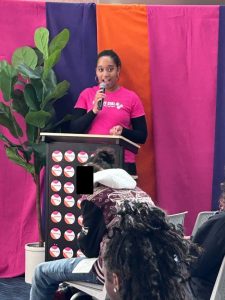
On a Saturday in mid-March, dozens of middle school and high school girls from throughout the Puget Sound convened in Lynnwood for “Unlocking Your Power Within,” a one-day mentorship conference. Panelists encouraged girls to channel their power—emotional, creative, social, and visionary—with hands-on activities. Jae Williams, a second-year student in the Community Oriented Public Health Practice (COPHP) program, organized the event for her capstone project, in partnership with Lynnwood-based nonprofit Project Girl.
She reflected, “Project Girl’s goal is to provide a space for young girls of color to be themselves, find their voice, and express themselves, which I related to a lot, and I wanted to be a part of that work.”
The COPHP program employs problem-based learning: each class, students work together to devise a solution to a novel case study. All second-year students complete a capstone with a local government or nonprofit, putting their problem-based learning skills to the test.
“The COPHP program has just given me so many opportunities to have hands-on learning as part of my coursework, which feels super unique across the whole spectrum of MPH programs across the country. I think it does make me competitive as I am trying to claw my way into the job market,” Williams said.
“You have power that’s inherent to you, and no one can take that from you. The point of the event was to bring together girls who didn’t know each other, give them time to meet each other, learn about themselves and others, and expand their minds to their own power.”
– Jae Williams
Examining disparities faced by Black girls
Studies show consistent disparities between girls of color and their peers. In the U.S., Black girls specifically are more at risk of sexual assault and less likely to graduate high school than their white counterparts. When Williams conducted a literature review to understand the myriad barriers faced by Black girls, two key themes emerged: adultification and push-out.
Adultification is the well-documented phenomenon of adults in positions of power, especially in scholastic and healthcare settings, treating Black girls as more mature than they actually are. As a result, Black girls are penalized for behavior that might be excused for their classmates and expelled at higher rates.

Such perceptions contribute to push-out, a term popularized by the 2016 book Pushout: The Criminalization of Black Girls in Schools to describe students who are pressured to leave school after a suspension or other disciplinary action.
“School participation is a really good predictor of long-term health, so participating in school is a social determinant of health. If Black girls are being pushed out of schools because of adultification, then they cannot get that benefit,” said Williams.
Caring adult mentors and supportive peer networks can make-or-break school participation for Black girls. Project Girl aims to provide both. Williams envisioned “Unlocking Your Power Within” as a space for girls to bond, learn, and viscerally see that they are not alone. Her faculty advisor, HSPop clinical instructor Hallie Pritchett, applauded her drive and commitment.
“As her faculty advisor, it was clear that Jae’s decision, as a Black woman and public health student, to partner with Project Girl for her capstone was more than an academic decision—it was a personal commitment,” said Pritchett. “I felt inspired by her drive and how she would see herself in the girls this organization uplifts. Through this work, she aimed to challenge the systemic disparities that young Black girls face—from healthcare inequities to educational barriers and the weight of misogynoir.”
Creating a space for trust and vulnerability
In their write-up of the “Unlocking Your Power Within” event, the Lynnwood Times noted the inclusion of a talk from Musu Bakoto Sawo, a Gambian-born lawyer and human rights advocate who works as a fundraising manager at a Snohomish-based nonprofit. In her deeply personal talk, “Resilience in the face of adversity,” she told the story of how she survived child marriage and female genital mutilation.
“I remember wondering, ‘Is this subject matter too serious for the girls?’” Williams recalled. “But [the presentation] wasn’t all about that. It was also about moving past challenges.”

Other sessions tackled goal planning, “sisterhood not sabotage,” and making your own unique “personality sandwich.” During the “Big Sister Talk,” a signature activity at Project Girl, trained facilitators answered the girls’ anonymous questions about insecurities, friendships, and other intimate topics.
“It was an honor to support her goal to use this opportunity to create space for opportunity and joy,” said Pritchett. “[A space] where our stories are heard and honored, and the young women supported through the programming feel valued and know they belong.”
Williams hopes that girls left the conference with a newfound appreciation of their inner strength, resilience, and persistence in the face of adversity.
“You have power that’s inherent to you, and no one can take that from you. The point of the event was to bring together girls who didn’t know each other, give them time to meet each other, learn about themselves and others, and expand their minds to their own power.”